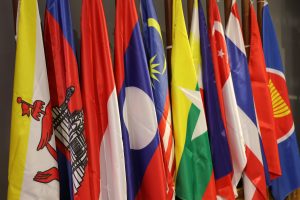Britain’s Foreign Secretary Liz Truss set the cat among the pigeons last week when she suggested that NATO should seek to boost security in the Indo-Pacific region by working with allies like Japan and Australia, and within groups like ASEAN.
For cheerleaders of the re-energized Quad, the recent formation of the AUKUS security pact, and a division of the geopolitical world between democracies and authoritarianism, her remarks were a welcome endorsement of an expansion of the West’s Indo-Pacific strategy.
That will be in play when the U.S. and ASEAN hold a Special Summit in Washington, D.C. – billed as a celebration of “four and a half decades of Dialogue Relations” – on May 12 and 13.
“NATO must have a global outlook, ready to tackle global threats,” Truss said. “We need to preempt threats in the Indo-Pacific, working with allies like Japan and Australia to ensure that the Pacific is protected,” she added. “We must ensure that democracies like Taiwan are able to defend themselves.”
Ever since the West began turning on China in the mid-2010s, the 10 ASEAN members have been pressured into choosing between the West or China, and have recently withdrawn with more of a focus on the economic and political problems at home.
Meanwhile, an Indo-Pacific NATO strategy was emerging by late 2020, when the first NATO Foreign Ministerial Meeting with Australia, Japan, South Korea, and New Zealand was held, and it’s a strategy that has only gained credibility following Russia’s invasion of Ukraine.
This is now a formal part of the NATO 2030 agenda. Washington has also made it known that ASEAN members are welcome to join the Quad alongside the U.S., Australia, India, and Japan, though there will be conditions.
“The Russia-Ukraine war has pressured the grouping’s members to choose sides. All members support the U.N. Charter and national sovereignty, but have differed on naming and shaming,” noted the Thai analyst Kavi Chongkittavorn.
The big three hitters – Indonesia, Malaysia, and the Philippines – are all democracies and fit neatly within Joe Biden’s grand plans for a security alliance capable of countering Chinese expansion and made-up of countries with shared democratic values.
Myanmar’s military has little choice but to side with Beijing while heavy debt will ensure Laos remains a Chinese vassal. Brunei has room to move and Vietnamese preferences lie with its export markets in the West, despite their incompatible style of governments.
Those on the edge of democracy – Cambodia, Thailand, Singapore – would be expected to demure on choosing while employing delaying tactics until there is little choice, as Kavi noted. However, signs of change are emerging.
Cambodia is increasingly leaning towards Japan as a traditional bridge between East and West to repair its damaged ties with the U.S. and scout-out alternative sources -of foreign funding as China scales back its generosity.
Singapore co-signed the U.N. resolution condemning Russia’s invasion alongside Cambodia, and will likely block Timor-Leste’s bid for ASEAN membership because of Dili’s growing ties with China.
On Monday, Japan and Thailand announced plans for an upgrade in economic relations and a new defense agreement, which would enable defense hardware and technology transfers from Japan and they also noted Tokyo’s “long history of ties with the United States military.”
The Americans were deeply annoyed when the initial dates for this ASEAN summit were postponed in March, due to clashing schedules. But they are now no doubt well-prepped for the first of its type summit to be held in the U.S. capital.
It’s a meeting that deserves to be closely watched.

































